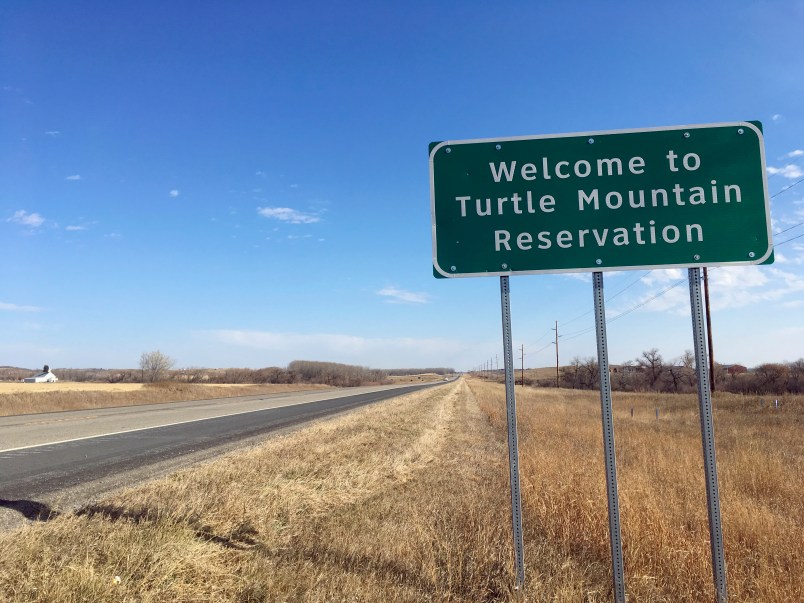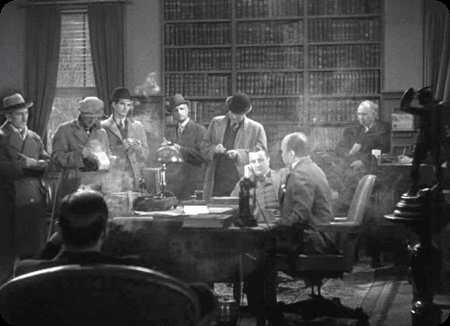BELCOURT, N.D. (AP) — Locating a house isn’t easy on the isolated and impoverished Turtle Mountain Indian Reservation in northern North Dakota, and that’s making it more difficult for residents and their counterparts on other reservations in the state to vote this election.
To cast a ballot, they need identification with a provable street address — something that isn’t important to the 19,000 people who live on the remote 72-square-mile block of land where most streets have no signs. In their culture, they’ve never needed them.
Tribal activist Wes Davis, 37, an official at the local community college and a lifelong reservation resident, describes where he lives this way — to the west of a gas station on the east side of town, behind the high school and across the road from another store.
“This is literally how we explain where we live here on the reservation, because that’s the way it’s been our whole lives,” Davis said. “People will understand because whenever we think of physical addresses, we think of infrastructure, or we think of pastures, or we think of families who live in a spot and we live alongside of them, those types of things. We don’t think of streets and avenues.”
The stricter voter ID rules are taking effect for the first time after a U.S. Supreme Court ruling earlier this month allowed the state to require street addresses, as opposed to other addresses such as post office boxes. Now tribes are scrambling to make sure everyone on the reservation can vote in the November election, which includes a race that could help determine control of the U.S. Senate.
The skirmish over voter access isn’t limited to North Dakota. Voters in at least eight states will face more stringent laws than they did in the last federal election, according to the nonpartisan Brennan Center for Justice. That includes Georgia, where alleged suppression of minority and women voters has become an issue in a heated governor’s race.
American Indians in North Dakota face a unique situation because the state is the only one in the nation without voter registration, meaning they have never really needed a street address to vote.
Before 2013, people without proper identification were allowed to vote by signing an affidavit attesting to their eligibility. The Republican-controlled Legislature ended that just months after Democrat Heidi Heitkamp won a U.S. Senate seat in 2012 by fewer than 3,000 votes, with strong support from American Indians, who tend to vote Democrat.
Voters must now be able to prove a residential address. That could potentially disenfranchise thousands of voters on the state’s five reservations, according to the tribes.
Republicans argue that Heitkamp’s victory had nothing to do with the legislation, and they’re simply trying to guard against voter fraud that Secretary of State Al Jaeger, himself a Republican, said “should be a concern for every voter.”
State officials note that everyone has a street address via the statewide 911 system and that those addresses are easily obtainable by calling a 911 coordinator in any of North Dakota’s 53 counties.
People on reservations say designated 911 addresses are relatively new and unknown to many, and that just getting an updated ID with an address can be problematic.
Many tribal members are homeless, lack transportation, don’t have necessary documents — such as a birth certificate — or simply can’t afford one.
“Fifteen dollars for an ID could mean the difference between a single mother buying milk for her children for three days or getting an ID to go vote,” Turtle Mountain Chairman Jamie Azure said.
The Turtle Mountain Band of Chippewa challenged the voter ID law in 2016. A district judge ruled that a P.O. box should be OK, but was overruled by the 8th U.S. Circuit Court of Appeals. Judges there accepted the state’s argument that it could lead to people voting in the wrong districts and to fraud.
Though the U.S. Supreme Court agreed, Justice Ruth Bader Ginsburg said in a dissent that “the risk of voter confusion appears severe here.”
With high interest in the U.S. Senate race between Heitkamp and her Republican challenger, U.S. Rep. Kevin Cramer, tribes and advocacy groups are now scrambling.
Tribes are handing out free IDs in advance of the election and at polling sites on Election Day. They’re arranging special events, including a Saturday concert on the Standing Rock Reservation featuring musician Dave Matthews.
On Turtle Mountain, about 100 people are coming in for free IDs each day, said Kandace Parisien, director of the tribe’s motor vehicle department, which is issuing them. Delaine Belgarde, 40, who was among the crowd there Wednesday, called the program “awesome.”
The Lakota People’s Law Project is mounting a ground campaign to educate tribal voters on the ID requirements, and to help those who need it get to the polls on Election Day.
The Four Directions group also is helping Native American voters get the addresses they need.
“There’s a whole lot of baling wire and duct tape being put into place, because the Legislature, attorney general and secretary of state decided they’d try to take out the Indian vote,” said Bret Healy, a consultant for the nonprofit that advocates for Indian voting rights.
Jaeger vehemently denies that and maintains that voter fraud is a distinct possibility without the requirement. After the 2016 general election, his office studied 16,000 affidavits submitted under the old system and could not verify 3,600 of them.
“It could have been that all 3,600 voters were legitimate voters, but when we can’t find them afterward, that puts a cloud on the election,” he said.
Max Feldman, an attorney in the Brennan Center for Justice’s Democracy Program, said the fraud potential that states often cite in passing more restrictive voter laws is actually extremely rare.
“Many of these laws are passed by GOP legislatures with GOP governors,” Feldman said. “They often have the effect of disenfranchising marginalized voters — people of color and low-income voters.”
The voter ID issue in North Dakota has galvanized the tribes, according to Azure.
“It’s unifying the people,” he said. “It’s getting people interested, it’s getting people looking at the issues, looking at the candidates.”
Colten Birkland, 19, who is voting on Turtle Mountain for the first time this November, is one of them.
“In the end, we’re going to do whatever we can to vote, and that’s the bottom line,” he said.







Go for it! Pull a Custer…with votes!
If the Republicans spent 1/10th of the time they spend on suppressing potential Democratic voters on getting informed and trying to govern in the public interest, they would be a party worth listening to. Instead, they lie, manipulate, oppress, discriminate, lie again and do everything they can think of to cheat their way to power. The anti-democratic ends they seek can’t ever begin to justify the means they abuse. They are vile.
The ND legislature started planning the disenfranchisement right after Hedicamp won. No Democrats allowed in our state! We’ll make sure that doesn’t happen again . Damn Injuns!

I am sickened by this. You know they were allowed to vote in the primary and I just can’t believe the Supreme Court okayed this so close to the election.
I hope there is a backlash. Hey, you put this hurdle up to stop me? How high do I have to jump? Hey, and I am bringing five of my friends…this is just so wrong. One of my husband’s closest friends is married to a member of the Standing Rock Tribe. She voted absentee here and headed back to her original home to help.
We have to fight these bastards every day and in every way that we can. They will never stop trying to take away our rights and we can never again let them back in control once we have gotten our country back.